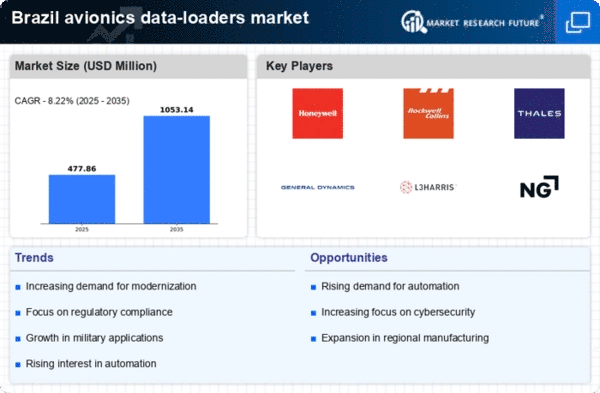Emergence of Smart Technologies
The advent of smart technologies is reshaping the avionics data-loaders market in Brazil. Innovations such as artificial intelligence (AI) and machine learning are being integrated into avionics systems, enabling more efficient data processing and analysis. This technological evolution is likely to create a demand for data-loaders that can seamlessly interface with smart avionics systems. As Brazilian aviation stakeholders increasingly adopt these technologies, the avionics data-loaders market must evolve to provide solutions that enhance data accuracy and operational efficiency. The potential for smart data-loaders to offer predictive maintenance capabilities could further drive market growth, as operators seek to reduce downtime and improve aircraft availability.
Rising Focus on Safety and Security
Safety and security remain paramount in the aviation industry, influencing the avionics data-loaders market in Brazil. Regulatory bodies and airlines are increasingly prioritizing the implementation of stringent safety protocols, which necessitate the use of advanced data-loaders capable of managing critical avionics data. The Brazilian National Civil Aviation Agency (ANAC) has established regulations that require enhanced data management systems to ensure compliance with safety standards. This regulatory environment is expected to drive demand for sophisticated avionics data-loaders, as operators seek to mitigate risks and enhance operational reliability. The avionics data-loaders market must therefore innovate to meet these safety requirements, potentially leading to the development of new features and functionalities.
Growth of the Brazilian Aerospace Sector
Brazil's aerospace sector is poised for significant growth, which directly influences the avionics data-loaders market. With the country being home to major aerospace manufacturers and a burgeoning demand for both commercial and military aircraft, the market is expected to expand. The Brazilian government has been actively promoting the aerospace industry, with initiatives aimed at increasing production capabilities and fostering innovation. This growth is anticipated to result in a compound annual growth rate (CAGR) of around 5% over the next five years. As a result, the avionics data-loaders market will likely see increased opportunities for collaboration with aerospace manufacturers, leading to enhanced product offerings and technological advancements.
Investment in Infrastructure Development
Investment in aviation infrastructure is a critical driver for the avionics data-loaders market in Brazil. The government has committed to enhancing airport facilities and air traffic management systems, which is expected to bolster the aviation sector. With an estimated investment of $1.5 billion in airport upgrades over the next few years, the demand for advanced avionics systems, including data-loaders, is likely to increase. This infrastructure development will necessitate the integration of modern avionics technologies, thereby creating opportunities for the avionics data-loaders market to expand its offerings. As infrastructure improves, the efficiency and safety of air travel in Brazil will likely enhance, further driving the need for sophisticated data management solutions.
Increasing Demand for Modern Avionics Systems
The avionics data-loaders market in Brazil is experiencing a surge in demand due to the modernization of aircraft systems. As airlines and military operators seek to enhance operational efficiency and safety, the integration of advanced avionics systems becomes paramount. This trend is reflected in the Brazilian aviation sector, where investments in new aircraft and upgrades to existing fleets are projected to reach approximately $2 billion by 2026. Consequently, the need for sophisticated data-loaders that can handle complex avionics data is likely to grow, driving market expansion. The avionics data-loaders market must adapt to these evolving requirements, ensuring compatibility with next-generation systems and providing robust data management solutions.
















